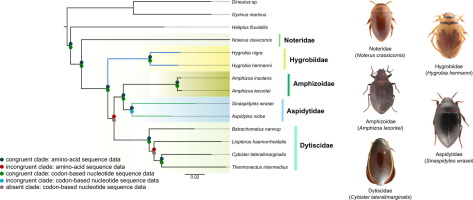Molecular Phylogenetics and Evolution ( IF 4.1 ) Pub Date : 2019-02-26 , DOI: 10.1016/j.ympev.2019.02.022 Alexandros Vasilikopoulos , Michael Balke , Rolf G. Beutel , Alexander Donath , Lars Podsiadlowski , James M. Pflug , Robert M. Waterhouse , Karen Meusemann , Ralph S. Peters , Hermes E. Escalona , Christoph Mayer , Shanlin Liu , Lars Hendrich , Yves Alarie , David T. Bilton , Fenglong Jia , Xin Zhou , David R. Maddison , Oliver Niehuis , Bernhard Misof

|
The beetle superfamily Dytiscoidea, placed within the suborder Adephaga, comprises six families. The phylogenetic relationships of these families, whose species are aquatic, remain highly contentious. In particular the monophyly of the geographically disjunct Aspidytidae (China and South Africa) remains unclear. Here we use a phylogenomic approach to demonstrate that Aspidytidae are indeed monophyletic, as we inferred this phylogenetic relationship from analyzing nucleotide sequence data filtered for compositional heterogeneity and from analyzing amino-acid sequence data. Our analyses suggest that Aspidytidae are the sister group of Amphizoidae, although the support for this relationship is not unequivocal. A sister group relationship of Hygrobiidae to a clade comprising Amphizoidae, Aspidytidae, and Dytiscidae is supported by analyses in which model assumptions are violated the least. In general, we find that both concatenation and the applied coalescent method are sensitive to the effect of among-species compositional heterogeneity. Four-cluster likelihood-mapping suggests that despite the substantial size of the dataset and the use of advanced analytical methods, statistical support is weak for the inferred phylogenetic placement of Hygrobiidae. These results indicate that other kinds of data (e.g. genomic meta-characters) are possibly required to resolve the above-specified persisting phylogenetic uncertainties. Our study illustrates various data-driven confounding effects in phylogenetic reconstructions and highlights the need for careful monitoring of model violations prior to phylogenomic analysis.

































 京公网安备 11010802027423号
京公网安备 11010802027423号